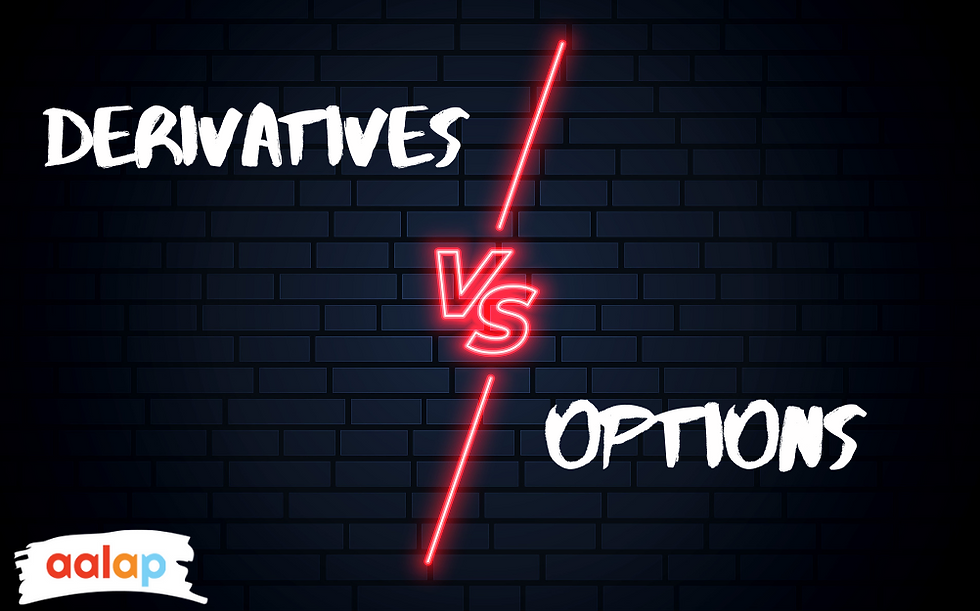Difference between Derivatives and Options
- Rohit More
- Jul 9, 2022
- 3 min read

To gain a deeper understanding of the difference between derivatives and options, you must be clear with their exact meaning of them. So we shall start with their basic definition and meaning, then we shall see how there is a difference between derivatives and options.
A derivative is a contract used by the investors that has value, and associated risk with the asset mentioned in the contract. While options are one part of derivatives. an option contract gives the liberty to sell the contract but the holder is not obliged to do so.
Derivatives are also contracts just like options, involving two or more two parties. The value of the contract is fixed depending on the asset it holds. Generally, derivatives contracts deal in bonds, Interest rates, Stocks, currencies, market indices, and commodities.
Derivatives include one agreed price, it has a date of expiry, and as options are also part of derivatives, they are often used as a tool for hedging and reducing the risk associated either with that asset or portfolio.
Derivatives are in practice for so long, earlier they were majorly used in the agriculture sector, wherein one person (farmer) agrees to sell all the crops to the other person (buyer) on a particular date and at some prefix price. They were performed based on verbal promises and mere handshakes, today due to the market revolution that has come down on paper and computers.
Options: When any thought comes to mind regarding the options, the first thing that lights up in mind is the equity options contract, which is a derivative having its market value. The equity option contract holder has the right to either buy or sell the underlying asset; that is equity at some predefined price known as Strike price but at the same time not obliged for the same. They can be sold either before the expiry or on the last date of expiry. The call option authorizes buying whereas the put option authorizes selling the underlying stock.
When options are executed by the contract holder, the seller must sell 100 shares of the underlying asset or stock per contract to the other party (buyer). Equity options are executed legally, with the central house that looks after clearing; it helps in maintaining transparency and liquidity because these two are very important factors in equity option derivatives.
What is the key difference between derivatives and options?
There is only one major difference between derivatives and options, that the option contract holder possesses all the rights to execute the contract but also he is not obliged to do, he may opt-out of the situation is not in his favor.
While derivatives are legal contracts and bound by the law, once you enter into the contract you must have to execute them on or before the expiry date.
Though many options derivatives are sold before the expiry date, to prevent the loss, they ultimately incur the loss as there is a difference in price purchased at and selling price. So those contracts that are being sold before the expiry always have this risk of the difference between purchase and selling price.
Difference between Derivatives and Hedging
Hedging is a type of investment for protecting some other investment, while derivatives we saw earlier are legal contracts between 2 parties.
Hedging is a term that is used to transfer the risk, while derivatives are tools that include hedging.
Options are also derivatives and may be useful for hedging purposes. In the same way, futures can also be useful for hedging and speculating purpose.
Derivatives vs. Options understanding the difference:

Conclusion
So, this was all about the difference between the derivatives and hedging and options contract, we hope you must be now clear with the terms, if you have any concerns regarding the same, and want to know more on this topic, you may contact us via comment box below. Thank you.



Comments